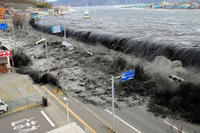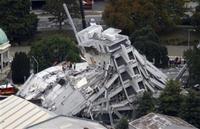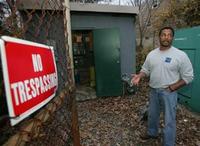-
Senate stalls on easing visa restrictions for highly skilled immigrants
A bill meant to allow more high-skill immigrants from India and China to obtain green cards has been placed on hold by Senator Charles Grassley (R-Iowa) over concerns that it should do more to “protect Americans at home”
-
-
Japan tsunami waves merged, doubling power

Researchers have discovered that the destructive tsunami generated by the March 2011 Tōhoku-Oki earthquake was a long-hypothesized “merging tsunami” that doubled in intensity over rugged ocean ridges, amplifying its destructive power before reaching shore
-
-
Making sure skyscraper foundations stand up to earthquakes
Engineers are preparing to conduct the first rigorous tests of how the steel columns that secure skyscrapers to their foundations stand up during earthquakes, research that could make the towering structures safer — and perhaps less expensive to build
-
-
Strong ground motion shows need to modify building codes
Population growth and scarcity of undeveloped metropolitan land have changed urban land use patterns and placed an increasing number of people and infrastructure in areas susceptible to topographic effects during earthquakes; building codes should take such trends into account
-
-
NERC CIP-compliant grid security reporting tool
NERC CIP Standard is a comprehensive framework of physical and cyber security best practices to safeguard the bulk power system for North America; Skybox Security shows NERC CIP-compliant grid security reporting tool
-
-
U.S. critical infrastructure security response system is broken
Since its inception, DHS has urged states and cities to establish Fusion Centers to collect information from power companies and water utilities about infrastructure-related incidents with national security implications. There are now seventy-two Fusion Centers in the United States. A recent confusion about the causes of disruption of an Illinois water utility pump raised question about the effectiveness of the Fusion Center information collection and reporting system.
-
-
U.K. unveils new cyber defense strategy
The U.K. government last week published its new Cyber Security Strategy; the government said the new strategy sets out “how the United Kingdom will support economic prosperity, protect national security, and safeguard the public’s way of life”
-
-
House Intelligence panel investigates Chinese telecom giants

As Chinese telecom giants Huawei Technologies Co. and ZTE Corp continue to eye the lucrative American market, they have come under increasing scrutiny from U.S. lawmakers who fear their technology could be used by Chinese hackers to steal U.S. secrets; the two Chinese companies are now the subject of a House Intelligence Committee investigation aimed at determining whether they are a threat to the United States
-
-
Sector Report for Monday, 28 November 2011: Infrastructure protection
This report contains the following stories.
-
-
DHS: Hackers did not cause Illinois water pump to fail
Cybersecurity experts and critical infrastructure operators can rest a bit easier now that DHS investigators have determined there is nothing to suggest that hackers caused a water pump to fail in Springfield, Illinois
-
-
Pentagon confirms policy of military response to cyberatacks
In a Pentagon report recently made public, the U.S. military confirmed that it would launch physical strikes in response to cyberattacks
-
-
U.K. banks pass cyberdefense stress test
To bolster cyberdefenses in the financial industry, U.K. banks recently took part in a stress test to determine their ability to cope with a cyberattack; eighty-seven banks took participated in the drill including Barclays, HSBC, and Royal Bank of Scotland
-
-
The increasing risks of GPS systems
During a recent meeting of the National Space-Based Positioning, Navigation, and Timing (PNT) Advisory Board, participants described how U.S. infrastructure is increasingly at risk due to the widespread use of GPS systems and the presence of interdependencies between different sectors
-
-
Building design lessons from the Christchurch earthquake

A leading infrastructure expert believes an assessment needs to be made of the level of “very rare” earthquake that needs to be considered in structural design, perhaps one with a 10,000 year return period or higher, rather than the 500 year return period that is commonly adopted for many buildings in Australia
-
-
DHS investigates attacks on New Jersey water supply

DHS agents and local authorities in New Jersey are investigating a series of attacks on the West Milford water system; since July there have been more than fifteen attacks on local water and sewage facilities that in some instances have resulted in sewage flooding the street or losses in service all together
-
- All
- Regional
- Water
- Biometrics
- Borders/Immig
- Business
- Cybersecurity
- Detection
- Disasters
- Government
- Infrastructure
- International
- Public health
- Public Safety
- Communication interoperabillity
- Emergency services
- Emergency medical services
- Fire
- First response
- IEDs
- Law Enforcement
- Law Enforcement Technology
- Military technology
- Nonlethal weapons
- Nuclear weapons
- Personal protection equipment
- Police
- Notification /alert systems
- Situational awareness
- Weapons systems
- Sci-Tech
- Sector Reports
- Surveillance
- Transportation
Advertising & Marketing: advertise@newswirepubs.com
Editorial: editor@newswirepubs.com
General: info@newswirepubs.com
2010-2011 © News Wire Publications, LLC News Wire Publications, LLC
220 Old Country Road | Suite 200 | Mineola | New York | 11501
Permissions and Policies
Editorial: editor@newswirepubs.com
General: info@newswirepubs.com
2010-2011 © News Wire Publications, LLC News Wire Publications, LLC
220 Old Country Road | Suite 200 | Mineola | New York | 11501
Permissions and Policies
